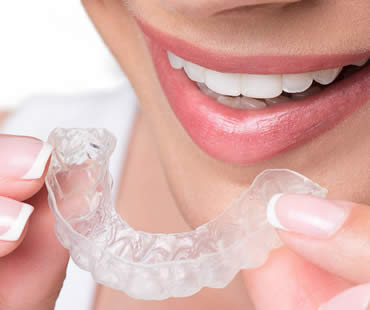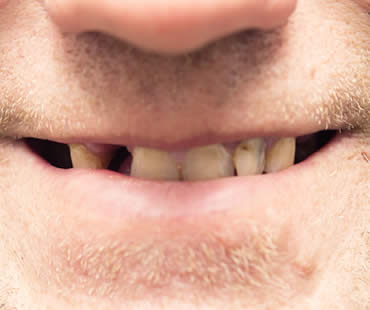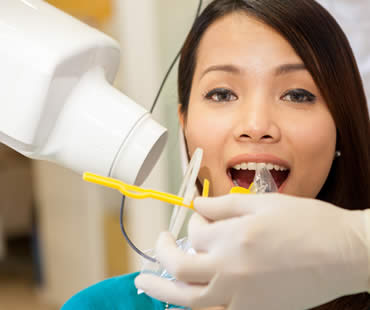
Dental implants can last a lifetime with proper care. Like natural teeth, dental implants require vigilant oral care to maintain their usefulness and prevent problems. Once the implant has fused to the jaw bone, it is important to follow some general guidelines to ensure the continued success of your dental implant and restoration.
A condition known as peri-implantitis is a common cause of implant failure. This occurs when an accumulation of plaque leads to damage of the tissues and infection of the bone around the implant. While the implant itself is not susceptible to decay, if plaque is not removed with thorough brushing and flossing at least twice per day the resulting periodontal disease can lead to implant failure.
Your dental professional may also recommend the use of additional oral hygiene products such as special brushes or oral irrigation devices to aid in the removal of food debris and plaque around the areas of the implant supported restorations. Your dentist or hygienist can assist in teaching you to utilize these devices to improve your implant care.
Regular dental visits and examinations are vital to detect and prevent any issues that may present problems for your dental implants. Expect to visit your dentist every 3 months for the first year after implant placement, and then every six months for the life of your implants. Your dentist will also provide special care instructions if your implants are being used to support a removable denture. It is important to know how to place and remove the appliance without causing damage to either the denture or your implant.
Avoid applying excessive pressure or eating hard foods that could cause damage to the restoration and implant area. If you suffer from conditions like teeth grinding or clenching, discuss with your dentist the option of being fitted for a night guard to prevent the problems these habits can cause your implants. Taking excellent care of your oral health will help to ensure years of dental implant success.
Schedule your appointment at our Fernandina Beach dental office

Your body is a little bit like a puzzle. It gives you clues to help you figure out what’s going on within your body. Did you know your mouth can give you hints about things that may be happening elsewhere in your body? Here’s a list of some of the signs your mouth can give you to pay attention to certain other aspects of your health.
Worn teeth and headache
If your teeth are showing extensive wear, you may be grinding your teeth. This would be even a stronger possibility if you’re also experiencing regular headaches, which can be caused by the muscle tension related to teeth grinding. This condition also indicates that you are likely under too much stress, and that you are unconsciously coping with it by grinding your teeth.
Gums covering teeth
If your gums begin to grow over your teeth and you are on medication, it may mean that your medication is at fault. Some medicines can cause your gums to overgrow, and the dosage needs to be adjusted.
Mouth sores
An open sore in your mouth that doesn’t go away in a couple of weeks can be an indicator of oral cancer. Numbness and unexplained bleeding in your mouth are other signs. Smokers and people over age 60 are at the most risk, but that doesn’t mean it doesn’t affect others too. See your dentist to make sure all is okay.
Cracked teeth
If your teeth begin to crack or wear extensively, you may have gastroesophogeal reflux disease (GERD). It’s a digestive disease that allows stomach acid to flow back into your food pipe and mouth. This acid can cause your teeth to deteriorate. Additional signs of GERD are acid reflux, heartburn, and dry mouth.
Unclean dentures
If you wear dentures, make sure you remove and clean them regularly. Inhaling food debris from your dentures that makes its way to your lungs can lead to pneumonia.
We look forward to seeing you in our Fernandina Beach dental office

Does your child need braces, but isn’t sure about being a “metal mouth” for two or more years? Did your teen come to you and beg for some other option to traditional braces? Perhaps you’ve heard about Invisalign aligners but are wondering if they’ll work for your child. Invisalign is absolutely appropriate for your teen if all of his or her baby teeth have fallen out and adult teeth have erupted.
Invisalign provides the same results as traditional metal braces, but without the metal brackets. Concerns over eating with braces are removed with the Invisalign trays, as they come out for meals, leaving your teen free to eat any food he or she desires.
Invisalign utilizes clear plastic trays that allow the process of straightening your teen’s teeth to be less obvious and less obtrusive. Beginning with x-rays and molds, your orthodontist will make a series of trays, called aligners. These trays are worn most of the day, taken out only to eat or to be cleaned. The process of straightening happens gradually and comfortably.
It is essential during this time that the trays are worn as recommended by the orthodontist. Wearing them less than the recommended amount of time will result in slower correction, and has the potential to lengthen treatment. Have your teen continue with any established good oral hygiene habits. Brushing and flossing must continue on a regular basis, brushing twice a day at minimum and flossing before bedtime.
Being a teenager is full of difficulties, and it is during this time that teens are at their most self-conscious. Adding metal braces to this transition can make everything worse for your child, leaving him or her self-conscious about eating with friends or smiling, talking or laughing in public. Your teen’s gapped, misaligned or crowded teeth can be improved significantly with Invisalign trays. Talk to your orthodontist today to see how Invisalign can make a difference for your child.
If you need a dentist in Fernandina Beach contact us today

Your family dentist knows that your child’s pacifier serves an important purpose. It soothes and comforts your child during difficult or stressful events. During the time of infancy, pacifiers are common and valued. Extended use of the pacifier during the development of the teeth, however, can lead to unwanted changes to your toddler’s mouth.
Sucking too hard on a pacifier, just like sucking too long on fingers or a thumb, can have serious consequences to a child’s teeth and even to the shape of the child’s face. Your family dentist will tell you that you should take away your child’s pacifier by the age of two years, preferably by the end of the first year. Failure to stop the use of a pacifier can lead to extended orthodontic care in the future.
Your family dentist can show you research that indicates that pacifier use beyond the second year is linked with crossbites, open bites, misaligned bites, a narrowed jaw, tongue thrust and malformed palate. It is also associated with an increased risk of a middle ear infection.
If your infant is using a pacifier, follow these guidelines:
- Clean the pacifiers regularly and properly to prevent bacterial growth.
- Discard and replace pacifiers that exhibit any signs of discoloration or cracking.
- Clean any new pacifiers prior to giving them to your baby.
- Make pacifiers available only during specific times, such as at naptime or bedtime.
- Purchase pacifiers specifically recommended by orthodontists for minimal damage to the mouth.
- Never allow your baby to “wear” the pacifier by tying it around his or her neck. This is dangerous. Pacifier clips can allow you to clip the pacifier to your baby’s clothing with a short, safe length of material.
Your family dentist will have important tips for you when you begin to wean your child away from pacifiers. Don’t let this habit extend beyond being useful to becoming harmful.
If you need a dentist in Fernandina Beach contact us today

As we age, our birthdays tend to bring new oral health issues along with them. It’s a fact of life that our teeth and gums are impacted by our age. Here are some common problems to watch for, and suggestions for treatment.
Gum disease:
Regular dental checkups and cleanings are vital to avoid gum disease. The first stage is called gingivitis and it’s reversible. If untreated, it can lead to a very serious advanced stage called periodontitis. You may not experience signs of gum disease, so practicing good oral hygiene and seeing your dentist are the best ways to keep it at bay.
Tooth sensitivity:
If cold or hot foods cause you discomfort, you have a common problem called tooth sensitivity. It can result from decay, worn fillings, gum disease, broken teeth, or exposed roots. Your dentist may recommend toothpastes designed to reduce sensitivity, or other treatments based on the cause of your problem. Good oral hygiene can help with sensitivity also.
Missing teeth:
If you are missing any teeth, it not only looks unappealing but it can also affect your ability to eat and speak. Your other teeth may move, and bone loss can occur. Discuss treatment options with your dentist because you might be able to restore your smile. Bridges, implants, and dentures are a few of the dental advances that might help.
Dry mouth:
Medicines and some health conditions often cause your mouth to be overly dry. Having a dry mouth is uncomfortable, but it also can seriously impact your teeth and gums. Without saliva to naturally clean your mouth, the risks of tooth decay and other problems increase. Ask your dentist to look for signs of decay, and to help you identify the cause for your dry mouth. Be sure to tell your dentist about your medical history and medications.
Oral cancer:
Oral cancer can include your gums, lips, cheeks, tongue, jaw, throat, or soft palate. It sometimes begins with just a tiny spot or swollen area, so regular dental checkups can help catch this disease early. A variety of treatment options are available, but early detection makes a difference.
Schedule your appointment at our Fernandina Beach dental office

Your good health depends on taking excellent care of your teeth. Not only does proper dental care protect your oral health, but it also has a major impact on your overall health. Routine brushing and flossing are just the start. Establishing a relationship with a good general dentist is a vital part of taking care of both your dental health and your general health.
The focus of general dentistry is to stop minor dental problems before they become large health issues. While many dentists now offer cosmetic and restorative treatments, the main responsibility of a general dentist is preventative. Treating cavities, performing root canal treatment, and performing regular cleanings and examinations are some of the important things services by a general dentist.
Even if you take vigilant care of your teeth, only a qualified dentist or hygienist can remove the plaque and tartar that forms around and below your gum line. Regular checkups allow your general dentist to detect problems that could potentially lead to more serious issues. Caught in the early stages, potential trouble like gingivitis or periodontitis can be successfully treated before they become bigger concerns. General dentistry procedures like scaling, root planning, and root canal treatment can be used to save infected teeth.
Prevention is the key to a healthy smile. Taking proper care of your teeth at home and keeping a regular schedule of cleaning and exam appointments with your general dentist will go a long way towards saving your smile for years to come.
Our dental office is located in Fernandina Beach







